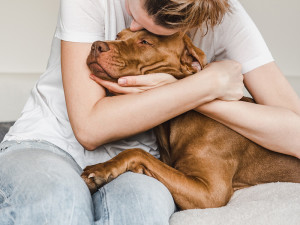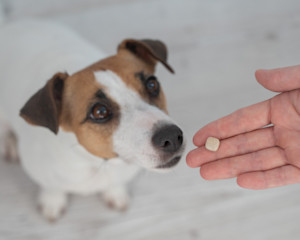Can Your Dog Get Bird Flu?
It’s normal to feel scared, here are all the facts

Share Article
In this article:
What is bird flu? Can dogs get bird flu Bird flu from bird poo? Bird flu symptoms in dogs Action for bird flu in dogs Bird flu diagnosis in dogs Bird flu treatment Bird flu prevention in dogs FAQs
Bird flu has been in the news a lot lately and, with a number of alarming stories about it affecting cats in the United Statesopens in new tab, you might be wondering whether it can affect dogs too. In this article we will look at what bird flu actually is, how it might affect our canine companions and what we can do to keep them safe.
What is bird flu?
Bird flu, or to use its scientific name, ‘avian influenza’, is an influenza virusopens in new tab that primarily affects domesticated and wild birds. There are a number of different strains of influenza virus, each varying in the severity of disease they can cause. H5N1 is a highly pathogenic subtype, which has made headlinesopens in new tab in recent years due to its ability to cause severe disease and death in birds across the globe, and also for its ability to infect wild and domesticated mammals, including cats and even humans.
Can a dog get bird flu?
Although bird flu is primarily a disease of birds, it has occasionally been found in mammals, including dogs. These cases are extremely rare and typically involve animals that have had close contact with infected birds, such as by eating a carcass.
While dogs can technically be infected, the likelihood of them becoming seriously unwell from bird flu is very low. They would need to be exposed to a large quantity of the virus in order to become ill.
Can dogs get bird flu from bird poo?
The virus can be present in bird droppings so it is possible, in theory, for a dog to contract bird flu through ingestion. However, current evidence suggests that infection requires significant viral exposure, such as contact with multiple infected birds or consuming a carcass. A casual encounter with bird faeces is unlikely to result in illness, although it is still advisable to prevent dogs from ingesting it.
Symptoms of bird flu in dogs
In the rare event that a dog becomes infected with avian influenza, they will typically go off their food, develop a persistent, dry cough, swollen lymph nodes and a fever. They may also have red, inflamed eyes, discharge from their nose and show difficulty breathing. Advanced cases will also develop neurological signs such as tremors, incoordination and seizures. Bird flu has been known to result in fatalities in some dogs.
What to do if your dog shows symptoms of bird flu
If your dog is showing any of the above symptoms it is best to get them checked by a vet as soon as possible. While bird flu remains extremely rare, similar symptoms can be caused by a range of other illnesses, many of which require prompt treatment.
How vets diagnose bird flu in dogs
If your dog has had contact with a suspected or confirmed infected bird and starts to show clinical signs, your vet may consider testing for bird flu. This usually involves taking a nasal swab (similar to a Covid-19 test), which is sent to a laboratory for PCR testing. The procedure is generally well-tolerated by most dogs, but sedation may be required in some cases if you dog is particularly uncomfortable with handling.
Bird flu treatment
Treatment of avian influenza is difficult. As bird flu is caused by a virus, antibiotics will not be effective. Instead, treatment is focused on supportive care to ease symptoms and manage any secondary infections. This may include oxygen, fluid therapy, medication to reduce coughing and antibiotics to treat secondary infections.
Can bird flu be prevented in dogs?
The best way to prevent bird flu in dogs is to limit their exposure to infected birds or environments. Avoid areas where large numbers of infected birds are presentopens in new tab. Do not allow your dog to scavenge on bird carcasses or droppings.
Bottom line: bird flu in dogs
While bird flu can affect dogs, it is exceptionally rare. Most cases reported in dogs involve close contact with infected birds, particularly through ingestion. Although the risk is low, pet owners should remain vigilant, especially during outbreaks in wild bird populations. Prevention is key; avoiding dead or sick birds is the most effective way to reduce risk.
Bird flu and dogs: frequently asked questions
Is bird flu common in dogs?
No, bird flu is exceptionally uncommon in dogs. To date, isolated cases in Thailand, Poland and Italy have been reported in dogs. At the time of writing, no cases have yet been identified in the UK.
Are dogs at risk for bird flu?
Whilst the disease is extremely rare in dogs, it is possible for dogs to contract disease from sick birds, if they are exposed to the virus in high enough concentrations.
Do dogs get sick from birds?
Yes, but its very unusual. The evidence so far suggests that dogs catch avian flu from infected birds. There is nothing to suggest that it is passed from dog to dog, although this is, in theory, possible.
How do I know if my dog has the flu?
Dogs with avian influenza show symptoms such as a cough, loss of appetite, red swollen eyes and a high temperature. These symptoms are not specific to bird flu and could be signs of other conditions. To make a definitive diagnosis your vet will take a swab from your dog’s nose.
References
World Organization for Animal Health (2023). Avian Influenza. [online] WOAH - World Organisation for Animal Health. Available at: https://www.woah.org/en/disease/avian-influenzaopens in new tab/.
OFFLU call to discuss Avian Influenza events in mammalsopens in new tab. (2023). OFFLU.
Chen, Y., Zhong, G., Wang, G., Deng, G., Li, Y., Shi, J., Zhang, Z., Guan, Y., Jiang, Y., Bu, Z., Kawaoka, Y. and Chen, H. (2010). Dogs are highly susceptible to H5N1 avian influenza virus. Virology, [online] 405(1), pp.15–19. doi:https://doi.org/10.1016/j.virol.2010.05.024.
Song, D., Kang, B.-K., Chul Seung Lee, Jung, K., Ha, G.-W., Kang, D., Park, S.-J., Park, B.-K. and Oh, J. (2008). Transmission of Avian Influenza Virus (H3N2) to Dogs. 14(5), pp.741–746. doi:https://doi.org/10.3201/eid1405.071471opens in new tab.
Szaluś-Jordanow, O., Golke, A., Tomasz Dzieciątkowski, Michał Czopowicz, Kardas, M., Mickiewicz, M., Agata Moroz-Fik, Andrzej Łobaczewski, Iwona Markowska-Daniel and Tadeusz Frymus (2024). Upper Respiratory Tract Disease in a Dog Infected by a Highly Pathogenic Avian A/H5N1 Virus. Microorganisms, 12(4), pp.689–689. doi:https://doi.org/10.3390/microorganisms12040689opens in new tab.

Dr Nina Blackmore, MRCVS, BVSc, PgCertSAECC
Nina Blackmore is a vet who, after leaving the Royal Army Veterinary Corps, took up two very different lives. For four long, chaotic days each fortnight she lives in a tiny house next to a small animal veterinary hospital in Boston, managing hospitalised patients and treating any emergency cases that turn up. As well as emergencies she also has a keen interest in pain management and acupuncture. The rest of her time is spent in a quirky bungalow in Rutland where she and her husband run a self sufficient small holding and a dog home boarding business. She spends her life surrounded by animals and has made it her life goal to help as many as possible.
Related articles
Can Dogs Get Covid?
The pandemic started over four years ago, but there are still new strains popping up. Here’s what we know about dogs and Covid-19 now
Can Cats Get Covid? What Every Pet Parent Needs to Know
Expert answers on Covid-19 and cats – plus symptoms to watch out for
![Jack Russell dog looking at human hand with a pill in it]()
Can You Give Your Dog Antihistamines?
You might just make it worse
What Can I Give My Dog for Pain Relief? Safe & Effective Options
Safe pain relief tips for dogs, plus when to call the vet for help




